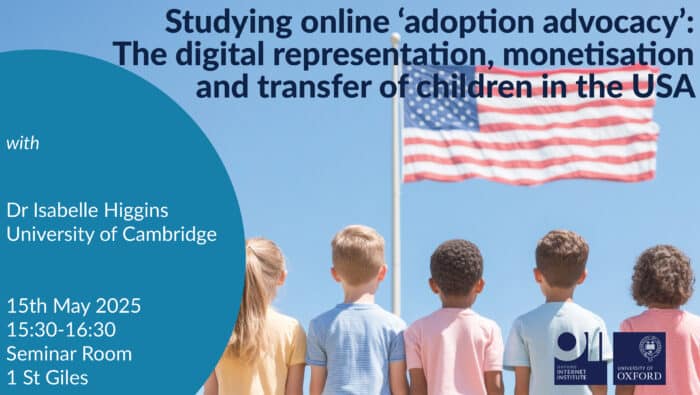15:30 - 16:30,
Thursday 15 May, 2025
1 St Giles

About
In this talk, Dr Isabelle Higgins draws on her PhD research conducted at the Department of Sociology, University of Cambridge, as well as the more recent legislative scoping she has conducted as a Tech Policy Fellow at the University of California Berkeley. This work explores how children deemed eligible for adoption in the USA are represented and monetised by a range of digital ‘adoption advocates’, including governments, private adoption agencies and adoptive parents. Though there have been extensive studies on the racialised political economic forces that shape US adoption practices, and separate research into the racialised structures of digital technology, Higgins’ work breaks new ground by considering how adoption practices are shaped by internet design and use. She shows that the everyday realities experienced by children in the US adoption process are shaped by the intersections of racial, reproductive and digitally articulated forms of structural inequality.
To make this argument, Higgins draws primarily on digital forms of data collected over four-year period, which she analyses using critical techno-cultural discourse analysis (Brock, 2018). Through such analysis, she shows that digital ‘adoption advocacy’ is a diverse but sustained set of practices concerned with encouraging the placement of children, currently living in state care or with their birth families in a range of global locations, with adoptive parents in the USA. This framing thus connect the work of state governments (who share images and photographs of children in their care) to the work of adoptive parent social media influencers (who represent and monetise their everyday family life and their children’s perceived alterity) as well as to the owners and designers of social media platforms, and generative AI technologies, whose data scraping practices likely engage with the personal information about children in the adoption process.
Dr Isabelle Higgins is a Teaching Associate in Media and Culture and Sociological Theory at the Department of Sociology, University of Cambridge. Isabelle is interested in studying empirical sites in which emerging forms of technology are made sense of and used by people in their everyday lives. She draws on a range of social theory to critically interrogate the power relations and expressions of social inequality that are reflected, refracted, reproduced or challenged in such empirical locations. Isabelle studied for her PhD, MPhil, and undergraduate degrees at the Department of Sociology, University of Cambridge. She has received awards at all stages of her studies, and has held fellowships at Cambridge Digital Humanities, the John W, Kluge Center, Library of Congress and the New School Institute for Social Inquiry and the Leverhulme Centre for the Future of Intelligence. Currently, Isabelle holds a Tech Policy Fellowship at the University of California Berkeley, where she is exploring the policy implications that emerge from her empirical PhD research and subsequent engagement with generative AI technologies. She has published some of her initial research findings with the journal New Media and Society.
Attend Online
Speaker

Dr Isabelle Higgins
Teaching Associate in Media and Culture and Sociological Theory, University of Cambridge
Isabelle studies empirical sites where emerging forms of technology are made sense of & used in everyday life. She draws on social theory to critically interrogate power relations & social inequality